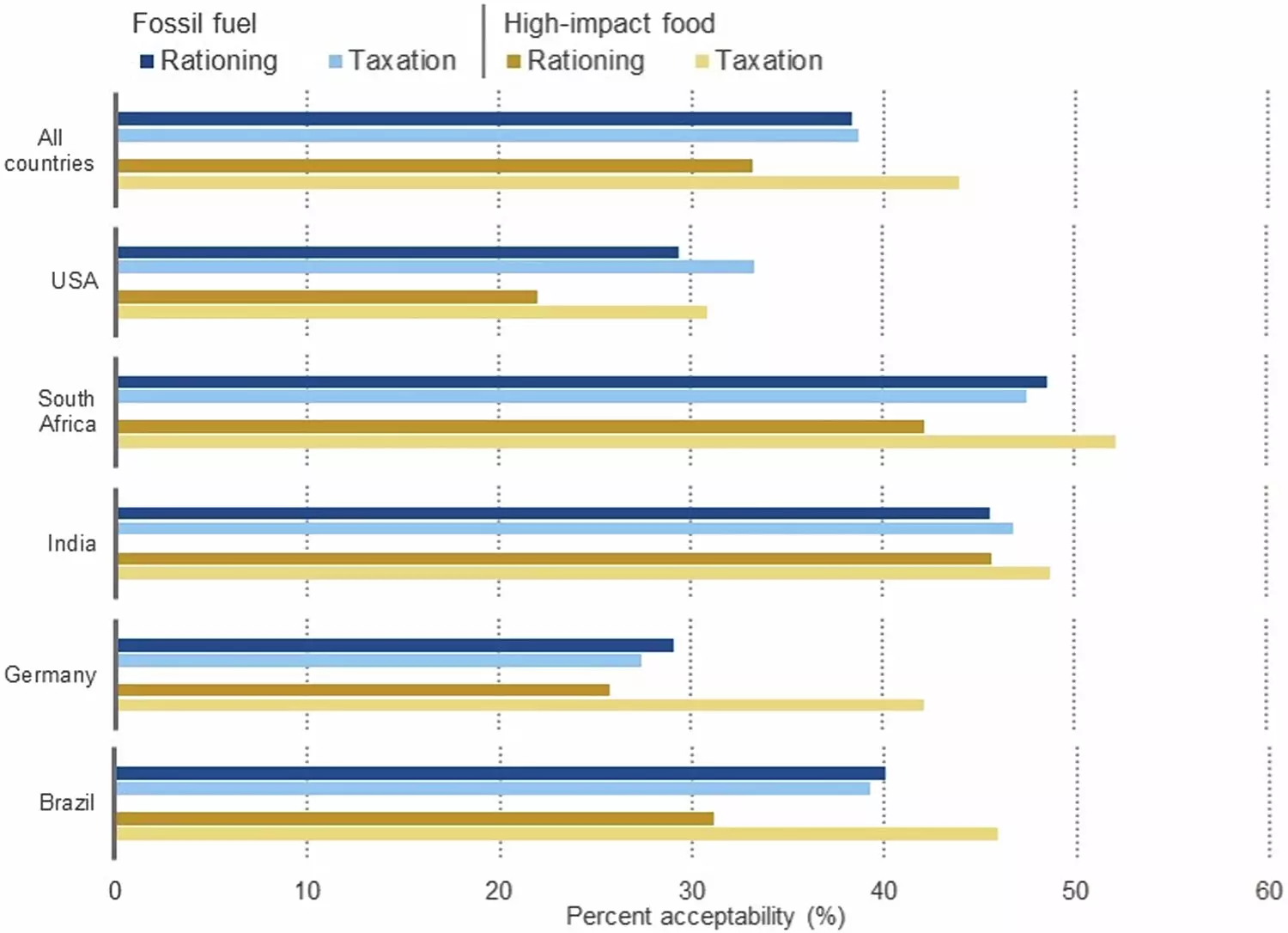The dialogue around climate change has reached a crucial juncture; traditional methods of addressing environmental challenges often seem insufficient in the face of escalating climate crises. Amid the plethora of initiatives like carbon taxes and sustainable energy investments, a novel concept is gaining traction—rationing. Grounded in recent research from the Climate Change Leadership Group at Uppsala University, the idea isn’t merely to regulate goods but to fundamentally alter our approach toward consumption and fairness. This article delves into the advantages of rationing as a strategy to curb greenhouse gas emissions, examining public perceptions and potential impacts on consumption behavior.
The study’s findings are illuminating, revealing that nearly 40% of the surveyed individuals from diverse countries—including Brazil, India, Germany, South Africa, and the United States—would be amenable to regulatory measures such as rationing fuel and high-emission foods like meat. This statistic suggests a shifting attitude, indicating that more people are beginning to appreciate the gravity of the climate crisis and the need for immediate, effective solutions.
Notably, the study emphasizes that peoples’ acceptance of these rationing measures can stem from perceptions of fairness. Oskar Lindgren, the main researcher, points out that individuals often resonate with policies that appear just, particularly when those policies do not disproportionately affect lower-income demographics. Rationing stands out as a viable option because it can be implemented uniformly, fostering a sense of collective responsibility.
In exploring public attitudes towards different climate policies, the study juxtaposes the acceptance of rationing against that of carbon taxes. The results are striking: the acceptability levels for both strategies are nearly identical. For instance, 38% of respondents supported fuel rationing, while 39% favored fuel taxes. This close alignment challenges conventional wisdom that suggests taxes might be more acceptable since they allow for personal choice while still addressing emissions.
Interestingly, there are demographic nuances in how these measures are received. In Germany, for instance, there is a higher percentage of individuals opposed to fuel tax compared to fuel rationing. This contrary finding prompts a reevaluation of how fiscal approaches might foster discontent, suggesting that direct consumption limits, in the right public context, may not elicit the backlash initially expected.
The varying levels of support for rationing across different nations is an essential aspect of the research. It’s particularly revealing that countries like India and South Africa exhibit a higher acceptance of rationing measures compared to Western nations, such as Germany and the United States, where fierce opposition to measures like meat rationing is noted.
This discrepancy could stem from cultural attitudes towards consumption and varying degrees of awareness regarding climate impact. In regions more significantly affected by climate issues, the impetus to adopt rationing may be perceived not just as a necessity but as a communal effort toward sustainability. It raises pertinent questions about how education on climate change can shape public policy support.
Another crucial takeaway from the study is the correlation between climate concern and acceptance of rationing. The findings suggest that younger and more educated individuals demonstrate a higher disposition towards such measures. This insight underscores the need for targeted educational initiatives that engage younger demographics, potentially leveraging their influence to advocate for collective action on climate issues.
Moreover, the idea that many are open to limiting their consumption—provided that others partake in the collective effort—highlights a pivotal opportunity for building community-based climate action models. If individuals see their peers participating in rationing, it could bolster their willingness to participate, creating a cycle of shared responsibility and environmental accountability.
The research emanating from Uppsala University sheds light on a crucial path forward in the fight against climate change. Rationing, with its promise of fair consumption reduction and public support, deserves varied implementations across different contexts. However, it also sparks a larger conversation about how we define civic duty in confronting climate crises. With a blend of policy innovation and communal commitment, rationing may indeed serve as an indispensable tool in the global ecosystem’s preservation efforts. Moving forward, a proactive reevaluation of our consumption patterns, paired with educational initiatives, could pave the way for a more sustainable future.


Leave a Reply